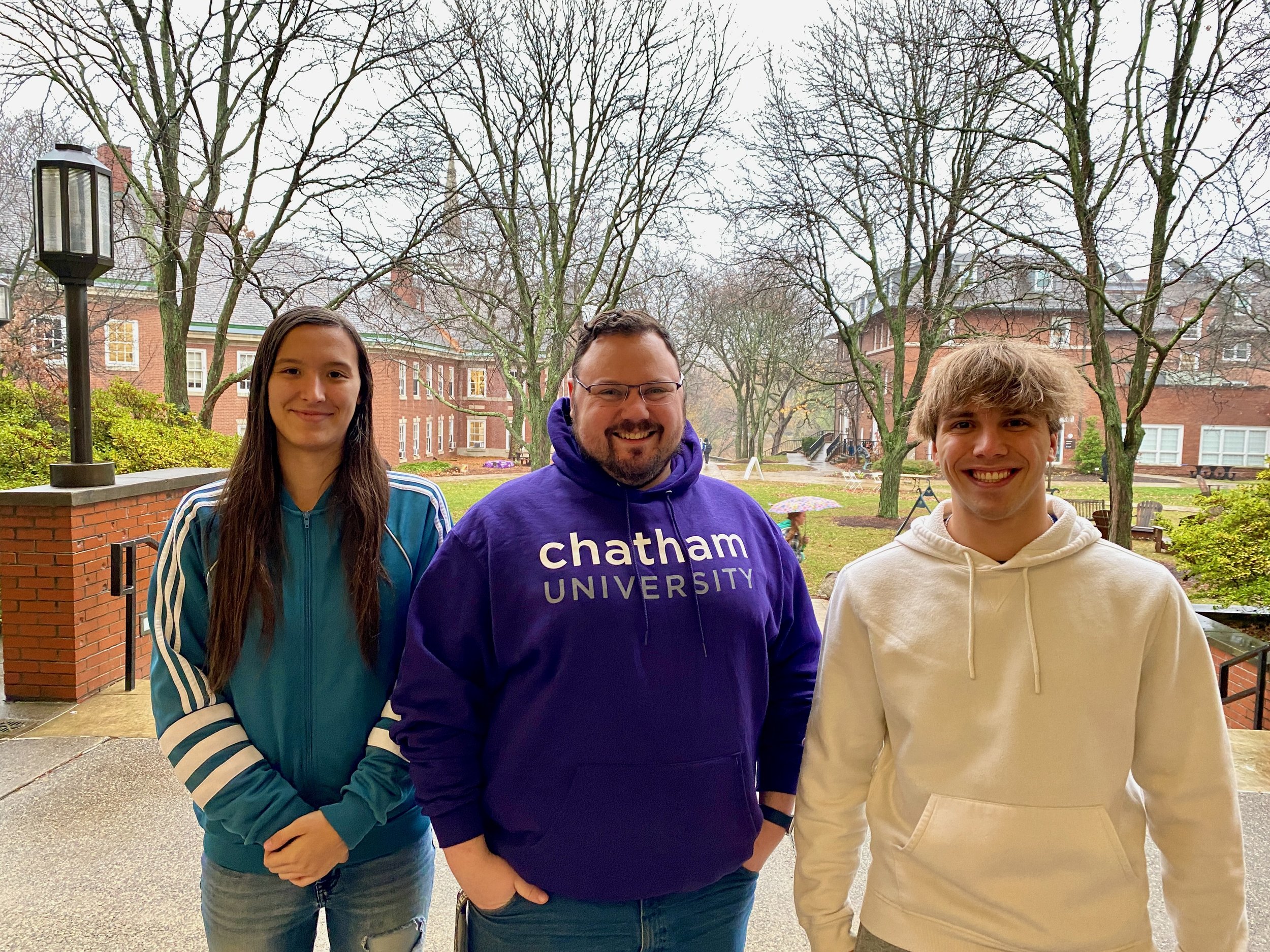How Success Coaches Help New Students Find Their Footing
From left: Kaitlyn Henn ’28, Sam Fuge, PsyD ’28, and Rory Shegan-Siniawski ’28 pose for a photo on the steps of the Jennie King Mellon Library. (Mick Stinelli)
When Rory Shegan-Siniawski ’28 came to Chatham University to study human biology, he had some concerns.
While he was attracted by the University’s proximity to home, its integrated degree programs, and its gorgeous Shadyside Campus, Shegan-Siniawski felt stressed. He didn’t know how he would make friends now that he wasn’t on a school hockey team. He wondered if the workload would be too much. He worried his grades might slip if he didn’t manage his time well.
Enter Sam Fuge, PsyD ’28, Shegan-Siniawski’s success coach. “He asked me questions about how I felt the year was going so far, how my classes are,” Shegan-Siniawski said. “He helped. I was glad I had that one-on-one [conversation].”
“He’s made classes a lot easier with the information he’s given me,” Shegan-Siniawski continued. “I think if I didn’t have him as an outlet, I wouldn’t be as well off as I am now. I think I would’ve figured it out eventually, but having that this early on has really helped my college experience so far.”
What’s a success coach?
Fuge, who travels to Chatham from Johnstown three times a week, is one of the University’s graduate assistant success coaches. They work with first-year undergraduate students, helping them acclimate to college, giving them tips for success, and connecting them with resources.
“I’m the point of contact, the go-to, for my students’ … academic issues,” said Fuge. “I’m kind of in a unique space, because I’m partly in this role, but I’m also a student. I’m not this faculty member reaching out to them; that may be a little intimidating.”
As part of being a success coach, Fuge co-teaches the SDE 101 course, Strategies for Success in College. “We cover a lot in that class,” he said. “It’s almost like a homeroom of sorts, in that we check in with them every week.”
The course aims to help new students by opening conversations around topics such as inclusion, diversity, dialogue with roommates, study habits, and empowering bystanders.
“All in all, I’d say that the success coaches are a great thing that Chatham has,” said Kaitlyn Henn ’28. She’s also one of Fuge’s students in the SDE course. “At least for your first semester, you have someone there if something goes wrong or if you need help finding resources.”
“They’re good with networking,” she added. “They’re good at helping you get what you need.”
One-on-one discussions
In addition to meeting weekly in Strategies for Success in College, Fuge’s duties include one-on-one meetings with Shegan-Siniawski and Henn twice this semester. They already had one.
Recalling their conversation, Henn said, “I wasn’t having a great week. He was just very positive. They interact in a way that it doesn’t feel like a forced discussion.”
“It doesn’t feel like pressure,” she added. “It just feels like you can openly talk and have a support system without going through a full-on therapy session, because it’s more pertaining to school and how you’re adjusting.”
“The main part of it that really stayed with me were the strategies for getting ready for the year, preparing for classes and exams, strategies to cope with stress,” said Shegan-Siniawski. “I do feel confident now that, if I need to open up about something, Sam would be able to talk to me.”
Fuge said their next one-on-one conversation will act more as a look back at the semester, examining how the students have grown, what challenges they’ve overcome, and how those experiences can inform their future.
“Chatham cares about their students, probably more than any place I’ve ever known,” Fuge said. As far as being a success coach, he said, “I think the program is fantastic.”
Learn more about Chatham’s Success Coach Graduate Assistant Program at chatham.edu.

